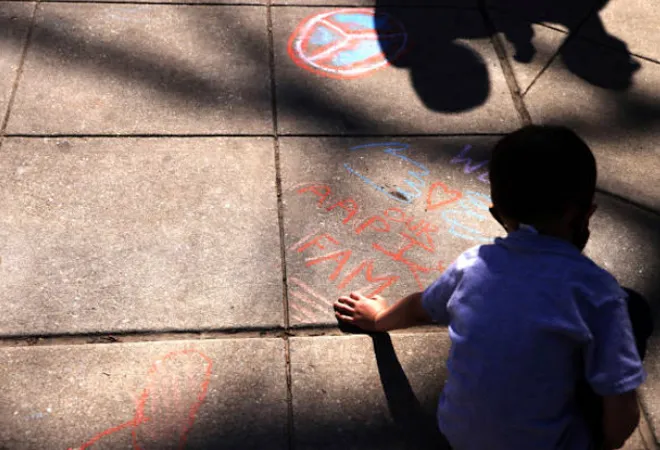-
CENTRES
Progammes & Centres
Location
Children in Georgia have so far remained protected from the direct consequences of the pandemic, but the indirect impact is yet to be fully assessed

This article is part of the series Children and the Pandemic: An Analysis Across Countries
Children are usually more susceptible and are carriers of respiratory infections; however, COVID-19 proved to be an exception in this regard. Compared to adults, children infected with COVID-19 rarely require hospitalisation. However, the indirect effects of COVID-19 on children are great, such as learning problems, and anxiety and depression caused by school closures or social isolation. Also, the economic and social crises caused by the COVID-19 pandemic is particularly severe for families with children who are more likely to be at risk of sliding into poverty. According to the International Labour Organisation, up to 66 million children worldwide may be in extreme poverty due to the pandemic.
It is understandable that countries, depending on their economic and social resilience, have coped differently with the problems posed by the pandemic. Therefore, we would like to briefly review the extent to which children in Georgia have been protected from the direct impact of the pandemic and what ill-effects we should expect in the future, especially if the pandemic continues indefinitely.
One of the first restrictions introduced by the Georgian government back in the spring of 2020 was the closure of kindergartens in Tbilisi and other major cities and the transfer of schoolchildren to distance learning.
The negative impact, especially indirect ones, of a pandemic on children may appear over a longer period of time and its analysis will require a number of serious professional studies to be conducted. This time, we will focus on the real threats and challenges that have occurred in Georgia over the past 18 months.
One of the first restrictions introduced by the Georgian government back in the spring of 2020 was the closure of kindergartens in Tbilisi and other major cities and the transfer of schoolchildren to distance learning. Gradually, this restriction had spread throughout the whole country and has been maintained with a few exceptions over the past year and a half. Sports and other sections were closed, so hundreds of thousands of children did not engaged in school activities.
A particularly difficult situation was created for preschool children. For many socially vulnerable families, kindergarten is also a guaranteed meal for their child. So the closure of all public kindergartens was a difficult decision that the government had to undertake. However, to somehow minimise the negative impacts on the families, the Tbilisi government introduced the distribution of food at home for children enrolled in kindergartens on a permanent basis.
It should be noted that in Tbilisi and other large cities, which are particularly affected by the pandemic restrictions, most of the population live in small multi-apartment flats. In the first stage of the pandemic, when the strictiest restrictions were imposed, the young children were virtually deprived of the ability to access fresh air and that was another serious challenge for families.
It should be noted that in Tbilisi and other large cities, which are particularly affected by the pandemic restrictions, most of the population live in small multi-apartment flats.
But the real challenge was shifting to distance learning. It is true that this has allowed us not to miss the 2020-2021 schooling process in the country, which is a really great achievement, but, in many cases, parents worry about the quality of distance learning. It should be noted that the existence of a solid material and technical base alone is not enough for the successful implementation of distance learning. It became necessary to transfer tens of thousands of teachers to completely new methods of teaching. Distance learning requires specific skills and not everyone has been able to solve this problem with equal success. It appeared that a part of the academic staff was not ready to use modern technology. In addition, the duration of lessons was reduced (to avoid excessive exposure of pupils to the computer screen) and all this inadvertently contributed negatively to the quality of learning.
The Ministry of Education, Science, Culture, and Sports of Georgia in collaboration with Microsoft created virtual classrooms for all public school classes and more than 580,000 profiles of “Microsoft Office 365” users were created: 528,327 for pupils and 52,125 for teachers. Besides, the Ministry introduced a web school, which means that up to 400 online webinars were conducted for entrants in two months.
In cooperation with the Georgian Public Broadcaster, the project “ was created, which envisaged conducting TV lessons for school children by experienced teachers in all subjects covered by the National Curriculum. Seventy percent of the students watching TV lessons and 57.3 percent of parents thought such lessons were interesting and fun.
According to a survey conducted by the LEPL Education Management Information System, 36,272 students (12 percent) did not have access to the internet, while 71,796 students (14 percent) did not have access to a computer device. As for the big cities, only 3.4 percent of the students did not have internet and 2.4 percent did not have equipment.
The Ministry of Education, Science, Culture, and Sports of Georgia in collaboration with Microsoft created virtual classrooms for all public school classes and more than 580,000 profiles of “Microsoft Office 365” users were created: 528,327 for pupils and 52,125 for teachers.
As for the situation of teachers in this regard, 1.7 percent do not have internet, 0.9 percent have no access to equipment, and 0.7 percent lack appropriate space. However, the multi-month survey of local NGO “Education Coalition” revealed that the technical problems that were identified as the main roadblock in the beginning had been overcome by the end of the semester. But another crucial problem emphasised was pupils’ attitude towards distance learning; they felt that this was not a “normal” learning process and did not take it seriously and with appropriate responsibility, which, in turn, had a serious impact on the quality of learning.
Although successfully conducted, online learning also comes with its own set of risks. The rapid transition to digital solutions during the pandemic has exacerbated problems for children’s online safety. Children spend more time learning, socialising, and having fun on virtual platforms, which makes them more vulnerable to online abuse and exploitation. Besides, the transition to distance learning due to the pandemic has affected not only the quality of education but also interpersonal relations between children. Along with the learning process, bullying has also moved into the virtual space. Internet bullying, which has been a problem before, has intensified. In addition, physical distance, quarantine, and self-isolation leads to childhood stress and depression, which can have a devastating impact on their physical and mental health. According to several studies, children are much more likely to experience mental health problems due to isolation and less physical contact with peers.
There are no official statistics yet on how restrictions have impacted children in general, as the Public Defender's Office of Georgia has not yet submitted its 2020-21 report.
On balance, children are no less at risk from the indirect effects of the pandemic, particularly economic hardship that has plagued many families, both due to additional constraints imposed by the pandemic and economic vulnerability in general. This remains the main challenge for the state—to protect children from the possible negative consequences of a difficult economic situation and extreme social deprivation, exploitation in the form of child labour, physical and psychological abuse of children, etc. Unfortunately, there are no official statistics yet on how restrictions have impacted children in general, as the Public Defender's Office of Georgia has not yet submitted its 2020-21 report. However, it can be said unequivocally that despite the severe epidemiological background in Georgia in recent months (the number of infected and dead has increased significantly), children have become a relatively protected group and so far, they have not been exposed to any additional threat, which would have added to the overall negative consequences of COVID-19. This could, however, be a misconception as there are no official statistics confirming this.
The views expressed above belong to the author(s). ORF research and analyses now available on Telegram! Click here to access our curated content — blogs, longforms and interviews.

Eka Siradze (LLM PhD) is Associated Professor of Tbilisi State University. Her specialization is law of the sea &: admiralty law Public International law and ...
Read More +